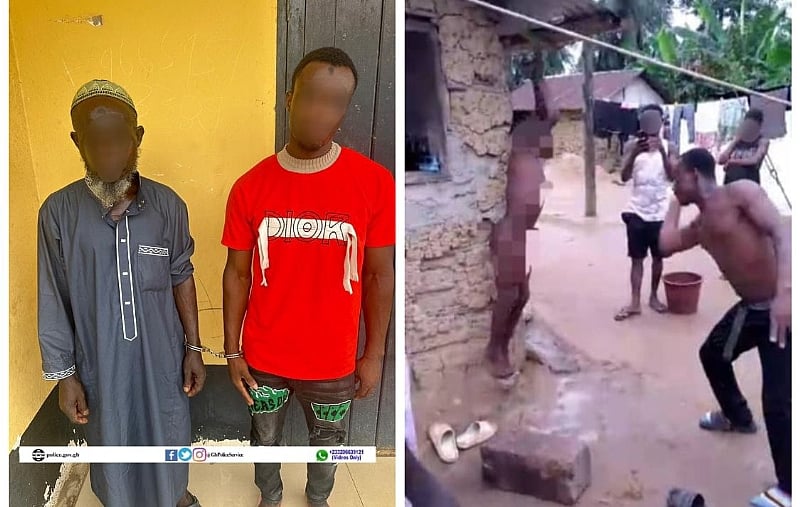Paragraph 1: The Incident
A deeply disturbing incident of child abuse unfolded in New Ankasa, near Elubo in the Western Region of Ghana, where a 12-year-old boy was subjected to brutal torture by two adults. The alleged crime committed by the young boy was the theft of GHS200 (approximately $17 USD). The cruelty inflicted upon the child was captured in a video that quickly went viral on social media, sparking widespread outrage and condemnation both within Ghana and internationally. The graphic footage showed the boy tied with a nylon rope and suspended from the roof of a building, while the two men mercilessly beat him. The video served as a stark reminder of the vulnerability of children and the urgent need for stronger child protection mechanisms.
Paragraph 2: Police Response and Arrests
Swift action was taken by the Ghana Police Service following the dissemination of the video. Officers from the Half Assini Division responded to the incident, rescuing the young boy from his tormentors. He received necessary medical care to address the physical injuries sustained during the ordeal and was subsequently reunited with his father. The two suspects, identified as 58-year-old Issah Morro and 27-year-old Suleman Abdul Rashid, were arrested and taken into custody. They are currently under investigation for their actions. The police statement, signed by Superintendent Olivia Adiku, Head of the Public Affairs Unit in the Western Region, confirmed the rescue and arrests, assuring the public that justice would be pursued.
Paragraph 3: Legal and Social Ramifications
The actions of Morro and Rashid are egregious violations of the child’s fundamental human rights and are punishable under Ghanaian law. Child abuse, in all its forms, is a criminal offense, and the severity of the punishment often correlates with the severity of the abuse. While the specific charges against the suspects are yet to be formally announced, they likely face charges related to assault, battery, unlawful imprisonment, and possibly child endangerment. The legal proceedings will determine their culpability and the appropriate sentencing. Beyond the legal implications, this case has sparked a crucial conversation about societal attitudes toward violence against children and the need for community-based interventions to prevent such incidents.
Paragraph 4: The Impact of the Video and Public Outcry
The viral nature of the video played a crucial role in bringing the incident to light and prompting swift action from authorities. In an age of readily accessible technology, such documentation can serve as a powerful tool for holding perpetrators accountable and raising awareness about critical societal issues. The widespread public outcry following the video’s release demonstrates a growing intolerance of child abuse and a demand for stiffer penalties for those who inflict harm upon children. The incident has galvanized public discourse on the need for strengthened child protection services, improved awareness campaigns, and readily accessible reporting mechanisms for suspected cases of abuse.
Paragraph 5: Child Protection and Community Responsibility
This incident underscores the critical importance of a multi-faceted approach to child protection. While legal frameworks and law enforcement play a crucial role, community involvement is equally essential. Neighbors, family members, and community leaders must take responsibility for safeguarding children. Creating a culture of vigilance and reporting suspected abuse can help prevent further tragedies. Educating children about their rights and empowering them to speak out against abuse is equally vital. Collaboration between government agencies, NGOs, and community organizations is crucial for implementing effective child protection programs.
Paragraph 6: Moving Forward: Prevention and Support
The incident in New Ankasa serves as a wake-up call for Ghana and the global community to prioritize child safety and well-being. Addressing the root causes of violence against children requires comprehensive strategies. This includes providing support and resources to families facing economic hardship, strengthening parenting skills, and promoting positive discipline techniques as alternatives to physical punishment. Investment in mental health services for both children and adults is crucial for addressing underlying issues that can contribute to violence. Building a society that values and protects children requires ongoing effort, vigilance, and a commitment to creating a safe and nurturing environment for all.














